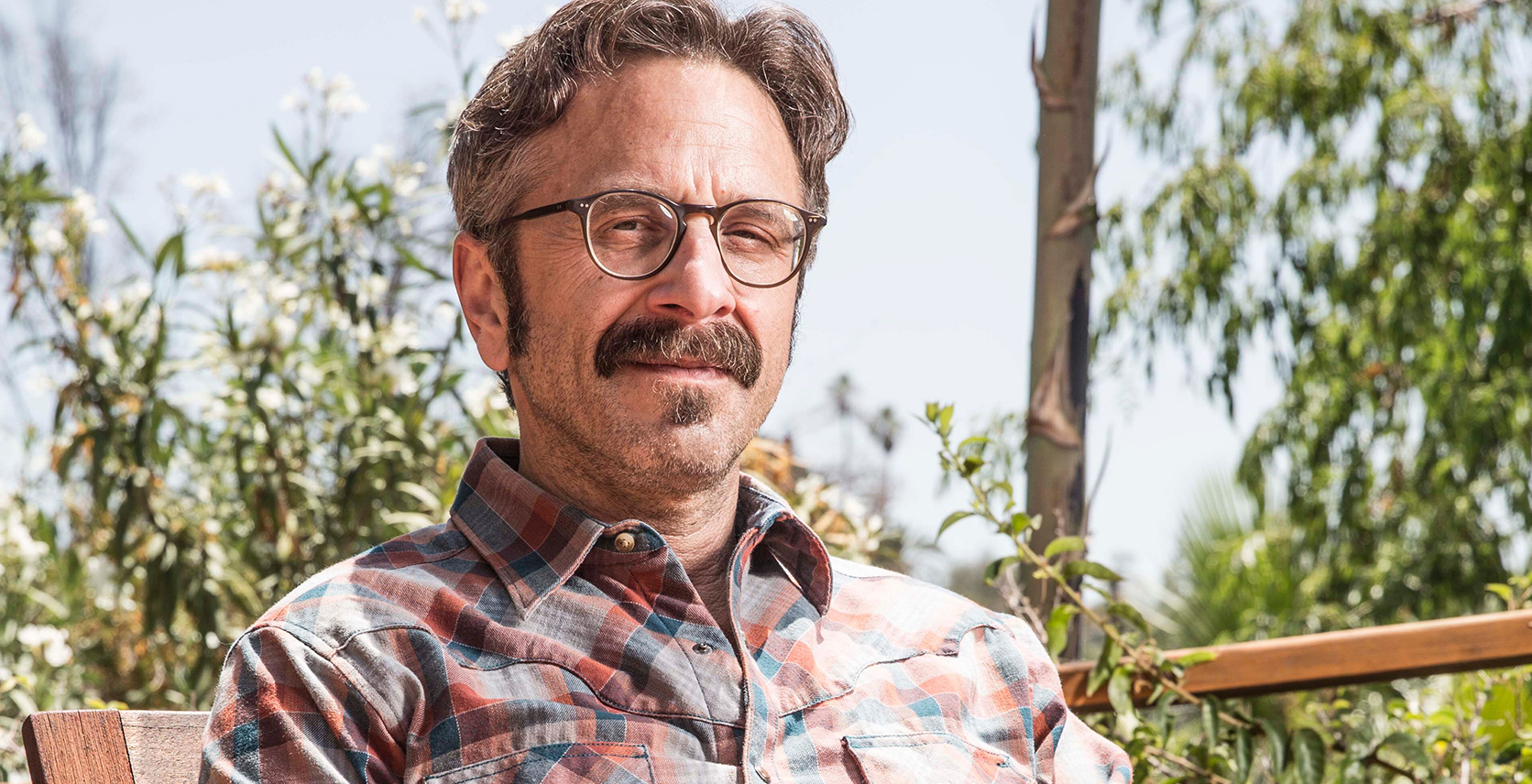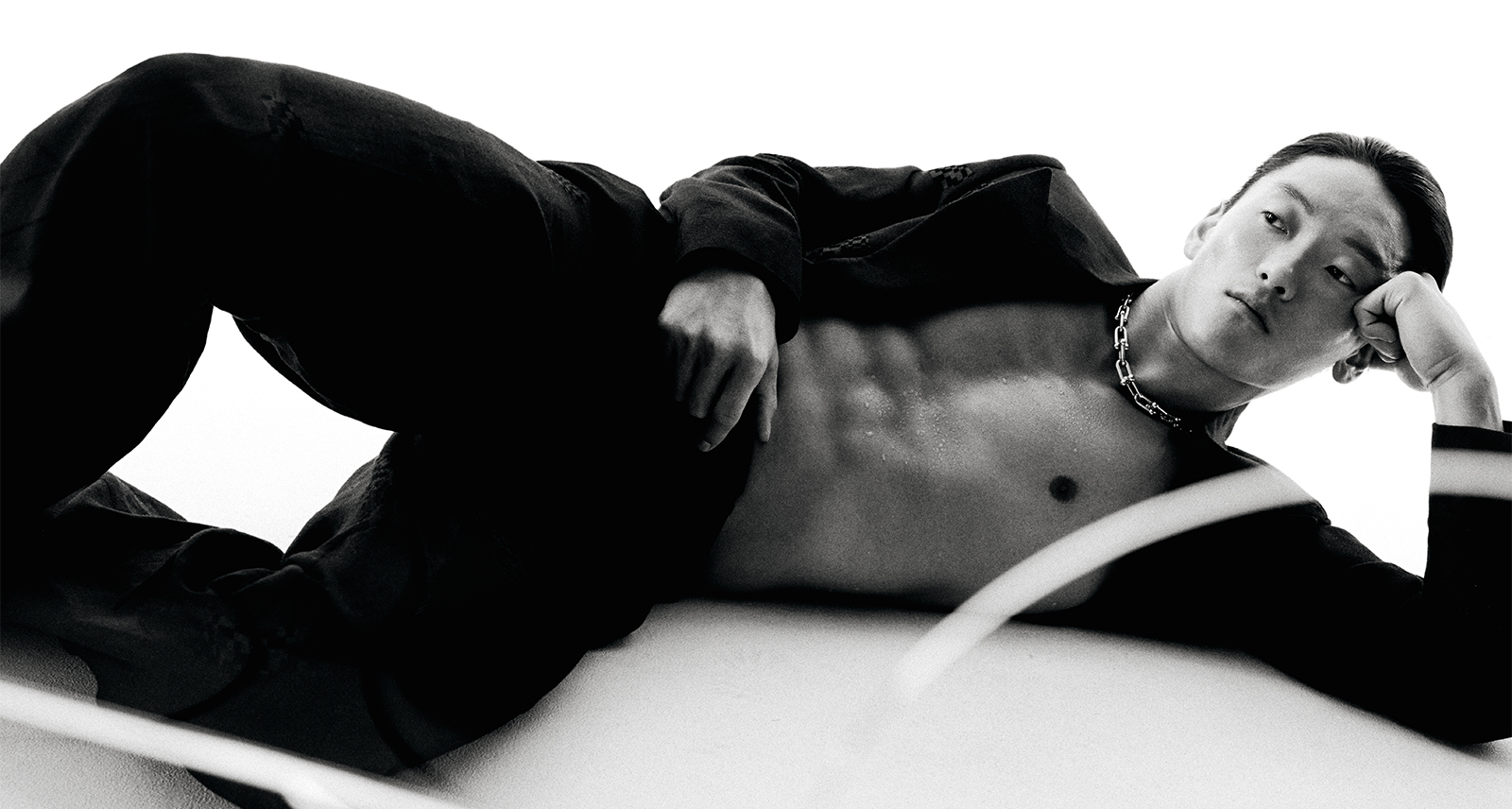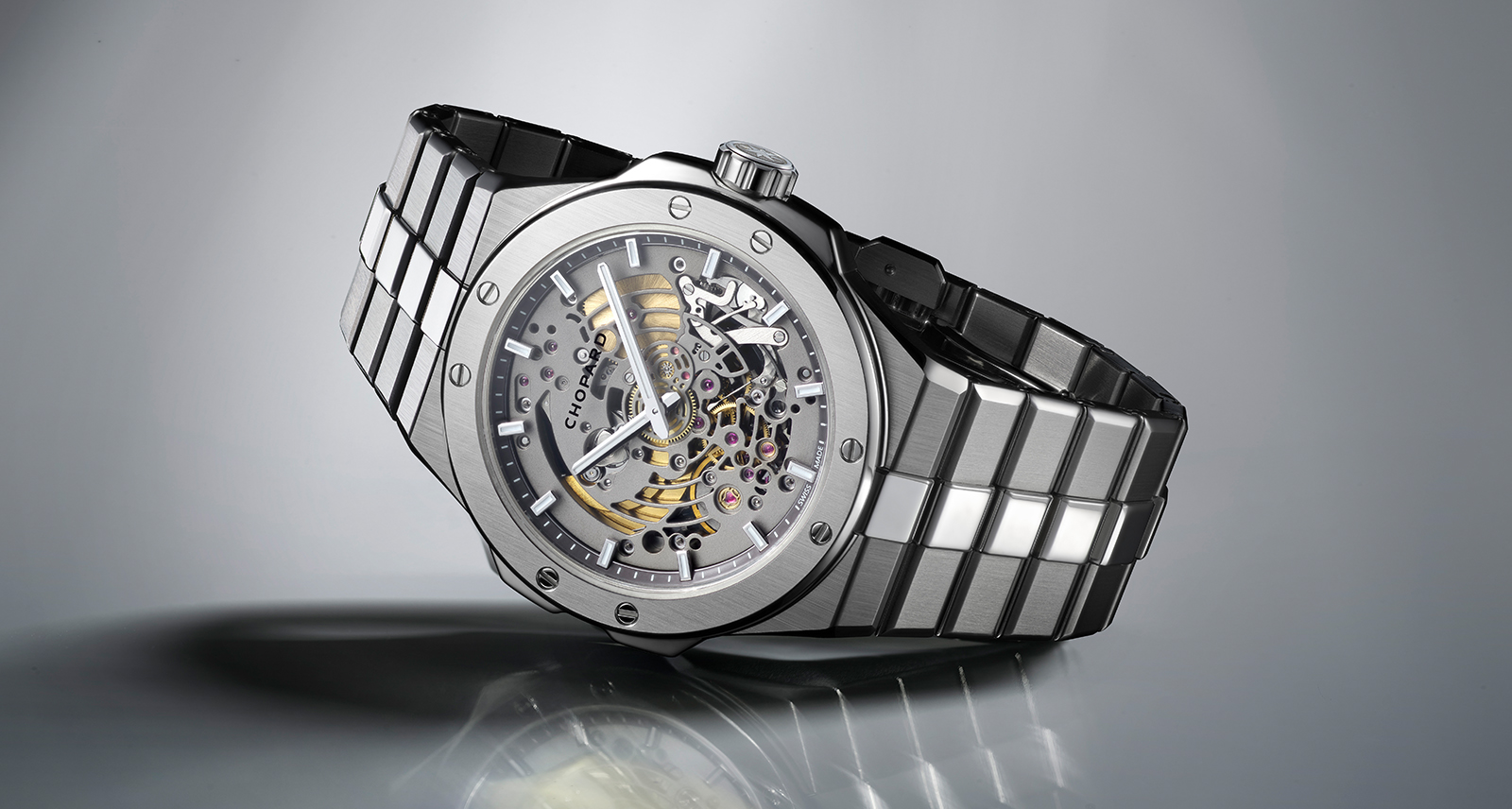Marc Maron Still Isn’t Sorry for Pissing Off Marvel Fans
Sony really owes Marc Maron one. For the last couple weeks, the comedian’s managed to draw the ire of Marvel fans away from the multinational conglomerate responsible for kidnapping Spider-Man, absorbing it all himself. That’s thanks to the solar eclipse-sized shade he’s been throwing at Avengers enthusiasts during the press tour for the much-anticipated film Joker — first saying comic book movies are for “grown male nerd-childs” on Conan, then comparing MCU fans to “outraged religious fanatics.” (Sure, you can argue Joker is itself a comic book movie, but Maron has clarified that it is in fact “grown up stuff.”) It’s safe to say Stan Lee stans hate this guy 3000.
Maybe all this ill will would’ve rattled the cranky, cynical Maron of yore, but when I speak with the 55-year-old — who’s headlining the JFL42 festival this week — he insists he’s doing just fine. And why wouldn’t he be? After many years of floundering, he’s had an incredible run of success; not only do his stand-up gigs now routinely sell out, he’s a lead on Netflix’s acclaimed dramedy GLOW, just had his first leading role in this summer’s indie flick Sword of Trust, and will appear in the upcoming David Bowie biopic Stardust and aforementioned Joker. Really, it’s all a byproduct of his wildly popular WTF podcast, which has blown up in its decade of existence due to Maron’s intuitive interviews and candour about his career struggles and divorce.
So, what’s a man whose material has been predicated on his own naked failure and misery have left to joke about now that he’s gainfully employed and in a healthy, functional relationship? And how does he really feel about all those angry nerd-childs out there? Well, we asked him just that.
So, how does it feel to be Public Enemy No. 1 of the nerd universe right now?
I don’t know if I’m Public Enemy No. 1. I think it’s a select slice of the nerd universe and I do think that maybe I was a little too general, too broad in my assessment of nerd culture. I’m okay with it. I mean, my criticism is really directed towards monoculture and it’s Marvel Universe-related. And if that comes off as a little aggressive, I understand, but yeah, I’ll reconcile it. I’ll watch some of those movies. We’ll see what happens.
Well, other people agree with you. I talked to Simon Pegg recently and he thinks our culture’s obsession with superhero movies is having an infantilizing effect on people. Doesn’t that sound dangerous?
Yeah, absolutely! I mean, that’s why I say what I say! But for some reason, when I say it, I get a shitstorm because I did a small part in the Joker movie. Whatever, man. You know, any time that they overreact like that, they’re just proving the point. It’s fine. I really don’t care. What happens is they threaten you with their power, the fan universe. Like, if you become persona non grata, they think that they’re somehow going to boycott things that I do or whatever. You’re allowed to have these opinions about culture. And maybe they took it a little personally and they reacted childishly and I get that. But it’s a valid assessment and if they don’t want to think they’re part of it, that’s fine. I’m not that upset about it. I caused a little flurry on Twitter for like two days and then it just goes away. I’m really the least of their problems. I’ve gotten a lot of e-mails about it — you know, about like, “Hey, I don’t think all nerds are like what you’re saying.” And I’m like, “No, I know that.” And then I think, Well, then just count yourself out and try to picture what I’m talking about.
Do you see any connection between this nerd rage aimed at you and what you’ve referred to before as “the army of unfuckable hate nerds”?
No, those guys are different! They’re different! They’re political. But the thing is that the tone is the same. Like, if I had said similar things that I said about Marvel movies about Trump, then I would have gotten a bunch of shit from that side of the nerd universe. And the tone is the same. You know, what I said about them acting like religious fanatics because I insulted their belief system, I still think that’s true. I think the real transgression was calling them, you know, “grown male nerd-childs,” which I think is how I garbled that on Conan. It was the name-calling that bothered them. If I would have just stuck with the criticism of Marvel, I think they would have taken it less personally. So, it was the name-calling that really started the whole thing. And I get that. That was probably a little insensitive on my part, but it was exciting to see them all react.
It was kind of funny!
They don’t like being called infantile.
Well, speaking of unfuckable hate-nerds, some people have been calling Joker a “rallying cry for self-pitying incels.” What do you think about that?
I don’t know. I don’t know what the whole movie’s gonna look like. You know, anything is open to interpretation. I’m fairly confident in thinking that wasn’t the intention. And I don’t, you know… I don’t know. I’ll have to see the movie. But I’m sure it wasn’t intended as that. I mean, any sort of piece of art or any movie can be read in any number of ways. But I am certain that was not the intention.
I sure hope not! I haven’t seen it either, but I’ve read it’s about a failed stand-up comedian angry that the world won’t pay him as much attention as he believes he deserves. I’m curious — do you see any parallels between the Joker and maybe yourself when you were less successful?
I don’t really think that’s right. I don’t think he was a stand-up comedian. I mean, in my recollection, he attempted stand-up comedy. Maybe once. In my recollection of the script, he wasn’t somebody who was out there struggling to be a comic. It was something he tried. He was a working, sort of for-hire party clown. So, I think that his ostracization from Gotham and his personality were based on other factors, which are explored in the film. But it wasn’t really about a comedian. You know, that is part of the film because that becomes a breaking point for the character, but he wasn’t like some guy out there doing comedy as a job or anything.
“No matter how happy I am, my brain still is a little screwed up and the world is a little screwed up and so is my relationship with the world. My general sense of discomfort around comfort is still existent.”
So maybe the real danger of this film is it might inspire more lonely white dudes to try their hand at stand-up comedy.
[Laughs.] Yeah, I don’t know which outcome is more threatening. That’s probably the less worrisome of the possibilities.
I hear you’re attempting to quit nicotine lozenges. Has that affected your stand-up at all?
Yeah, they do that. I’ve done this before. You get a little crazy the first week or so. So it’s made it kind of raw and exciting. It’s always a little exciting, obviously, and a little raw, but it’s very hard to manage your emotions and thoughts in those first few days when you’re withdrawing from anything. So I was up on stage doing it and it was great. There’s part of me that wishes it could be like that all the time; kind of slightly manic and unable to manage my emotions. It was an exciting set to be at the other day. Felt good, man, felt good.
Can we expect an emotionally unhinged performance in Toronto?
Maybe! Yeah, I mean, there’s always the possibility. I don’t think for the whole show but maybe a little bit.
I’ve noticed on your podcasts and in your stand-up sets lately that you’re more guarded about your personal life than you used to be. Why is that?
Well, because sometimes I think, specifically about personal relationships, what happens is there are other people involved and they don’t really have a voice in the narrative. It’s really about my personal life in terms of relationships, because over the last ten years I’ve been through a few and it’s always sort of a painful process. If I talk too candidly about it, I’m talking about someone else who’s also going through a difficult time and really doesn’t have a voice in it. So yeah, there’s a risk of misrepresenting someone else’s pain or making them uncomfortable. You know, the last relationship I was in, she was not really somebody who was that public a person, so it’s not really appropriate for me to make her one. So I’m just a little more protective of that side of my life, primarily out of respect for the other person involved.
Well, that’s fair. From what I gather, you seem to be in a good place right now — you’re thriving professionally and you’re in a healthy relationship. But they say great art comes from great pain. Do you find it’s easier to be funny when you’re miserable?
I don’t know, man. You know, I’ve talked to a lot of people about that. It depends what kind of funny you’re really looking for. A lot of people, a lot of comics are screwed up people, but so are a lot of plumbers. I don’t know. The truth is it’s really all a matter of what you like and what you consider funny. It’s a very subjective thing. With personal point-of-view comedy, if there’s a struggle there, if there’s a wall of pain that needs to be relieved or explored and that person is able to do that well, then yeah, in that case a certain amount of misery is preferable for the audience of that person and maybe for that person to create.
I find that no matter how happy I am — whatever that means; I wouldn’t say happy, but whatever contentment I have in my life — my brain still is a little screwed up and the world is a little screwed up and so is my relationship with the world. And also, my general sense of discomfort around comfort is still existent. So I don’t know whether that’s necessarily misery or pain but there’s something that’s always going to be at the core of somebody like me, that no matter what I do and no matter where I get, it’s still going to be there. And whether it’s integrated or it’s not integrated — you know, I’ve integrated a lot of whatever has caused me emotional distress or crippled me or hobbled me emotionally [into my comedy]. I’ve dealt with a lot of that, but it’s still down there and I can use it as a resource.
Nowadays, with the combination of social media and P.C. culture, a celeb who says anything even slightly contentious immediately gets vilified and pelted with all this indignation. I feel like the MCU incident is kind of an example of that. How do you navigate through this environment as a comedian?
I don’t know. You know, with the MCU thing, if that’s the worst that could happen to me along those lines, then thank God. I mean, if that’s the reaction of one particular fanbase over something… I don’t know if it was essentially political correctness or whatever you want to frame that as, but it’s a delicate time to be a comic. And certainly, if you’re going to say something, you better know why you’re saying it and where it’s coming from and be willing to shoulder the responses that you’re going to get for it. Everyone can still say whatever the hell they want. And you just have to be ready for a reaction and know that that is possible and choose whether or not that’s a fight you’re going to fight.
But I would say that it’s very important to continue to push the envelope and to question and to create conversation and be provocative. And I think that that can still happen; I think you can do all those things without being mean or without being a bully or without hunting down or diminishing people who are already struggling. I think there is a way to be provocative and continue the conversation without being an asshole. So, you know, you’ve just got to find your path. I think I was kind of an asshole in relation to the MCU guys but, you know, I don’t feel terrible about it. [Laughs.] I was kind of a dick but I know that. Occasionally I’m kind of a dick but I don’t think I was that wrong.










